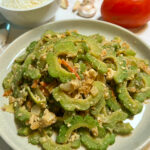This Beef Bulgogi is both delicious and so simple to prepare. With just a few basic Asian ingredients, you’ll have one of the most flavourful marinades that are perfect for Korean-style BBQ!
What is Beef Bulgogi?
Bulgogi is also known as Korean BBQ beef, where bul literally means “fire” and gogi means “meat”.
There are other variants which include the use of pork and chicken as well, though the heart of the marinade should remain the same.
One of the most common ways bulgogi is prepared is grilled over charcoals to give it that perfect, smoky taste. It can also be served to you in most Korean restaurants via a large pan to be stir-fried, or pre-cooked in a sizzling plate.

Ingredients
Thinly Sliced Meat: For a tender bulgogi, go for marbled, fatty, and tender cuts of beef like rib eye. Other cuts worth mentioning include the “loins” such as tenderloin, sirloin, and/or striploin. You can either cut the whole meat into thin strips yourself (just freeze the beef before hand for ease of cutting), or simply purchase the pre-cut packaged meat from a Korean grocery (try to look for the label “bulgogi” in the freezer/fridge section).
As for other cuts that may be a bit tougher (I’m talking cuts like flank or brisket), you can still get away with these -with proper preparation. Be sure to cut the beef against the grain to make them easier to chew. The marinade, which includes Korean pear, also contains enzymes which help tenderize the fibres of the meat, making it softer!

Korean Pear: Also known as Asian pear or Nashi pear, you can typically find these in most Korean grocers or in some Asian supermarkets. They provide additional sweetness to the bulgogi, while giving it a distinct, subtle taste (in way, somewhat floral and tangy).
If you have difficulty finding these, an easy substitute can be most red apples such as fuji, gala, ambrosia, or honey crisp.
Interestingly enough, there are actually regional variants and different Korean recipes that use other fruits like pineapple, kiwi, and peach as the main tenderizing agent! I’ve personally never tried these yet, but they sound absolutely delicious and can work perfectly as a pear/apple substitute as well.

Onion, garlic, soy sauce, mirin, sugar, honey, sesame oil, black pepper: These ingredients will make up the bulk of our bulgogi marinade. Some recipes will have you chop up the onion and mince the garlic, but I love grating/blending these instead which really helps to intensify their flavors in the sauce.
Instructions
Prepare the marinade by combining together the Asian pear, onion, garlic, soy sauce, mirin, sugar, honey, sesame oil, and black pepper in a blender. Blend until smooth and no chunks remain.

Pour the marinade over the thinly-sliced beef, being sure to thoroughly cover each piece. Let marinate for at least 1 hour.


Heat the oil in a pan over medium-high heat. Sauté the sliced onions and carrots until they’ve softened slightly, about 3-5 minutes.

Add in the marinated beef and continue to cook until its juices begin to release.

Once the beef is just about cooked-through and the juices begin to come out, stir in the green onions and give the pan one final stir fry to combine.

Top with sesame seeds. Serve immediately. Enjoy!

How to serve Beef Bulgogi
In its simplest form, beef bulgogi can be served with a side of rice for a quick and simple meal.
For a more Korean barbecue-style meal, my personal favourite is serving the bulgogi with lettuce, rice, and perilla leaves along with some kind of dipping sauce, such as ssamjang.
FAQs
Can I grill Beef Bulgogi?
Yes! You can follow this recipe as-is, and simply replace the stir-frying step with grilling instead. Grill the meat over charcoal or a simple grill pan for a delicious Korean-style BBQ (do note that this method doesn’t produce as much “juice” or sauce as the stir-frying method does).
How do I store leftovers?
Unused marinated meat should only be marinated for up to 24 hours. Anything longer than this, and I find that the marinade tends to break down the meat too much which alters its final texture (especially if you’re using stronger fruits, such as kiwi or pineapple!)
Other wise, you can freeze the bulgogi for up to 2 months, and simply defrost and cook when you’re ready to eat.
As for cooked leftovers, these can keep for up to 4-5 days in the refrigerator packaged in airtight containers. You can even re-purpose the bulgogi in dishes such as gimbap or bibimbap!
Looking for more delicious Korean recipes? Here’s some more that you might love:
Disclosure: Some links on this page are affiliate links, meaning that at no additional cost to you, we may receive compensation from purchases made through these links. As an Amazon Associate, I can earn from qualifying purchases.







